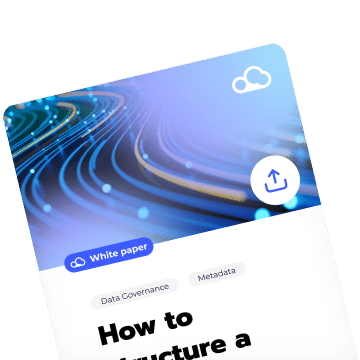In today’s digital age, data is a crucial asset for businesses of all sizes. It helps organizations make informed decisions, optimize operations, and stay competitive in their respective industries. However, access to data is often limited to a select few individuals or departments, leading to a lack of transparency and collaboration within the company. This is where data democracy comes in.
Data democracy refers to the idea that all employees within an organization should have equal access to the data they need to do their jobs effectively. Data democracy allows for a more open and collaborative work environment where everyone can contribute their insights and ideas based on the available data.
Data democracy: Overview & main principles
It is important to recognize that data democracy is not a data governance model. It is more of a corporate culture aimed at making the organization’s data available to as many—if not all—people as possible.
Certain principles underpin data democracy. For example:
- End users must be able to access information in any digital format.
- Each employee must be able to collect and analyze data without the need for outside assistance.
- Private personal data must be protected.
In practice, data democracy requires all employees to be able to extract value from data and realize its potential. This accessibility enables certain opportunities to be pursued and more value to be created.
The benefits of data democratization
Data democratization offers companies several advantages. For example, offering self-service access to data boosts team efficiency and unleashes innovation. Specifically, providing data access to all employees at all levels is ideal for increasing commitment and gives them all the resources they need to meet established goals.
On a broader level, data democracy enables the development of new services and the improvement of existing ones. Allowing everyone in an organization to work with data, regardless of their technical knowledge, is ideal for making informed decisions and improving the customer experience.
Other benefits include:
- Improved decision-making: By giving all employees access to the same data, organizations can make more informed and accurate decisions as more people can contribute their insights and perspectives.
- Increased collaboration: Data Democracy encourages collaboration and teamwork, as all employees can share and discuss data with each other. This leads to better communication and a more cohesive team.
- Enhanced productivity: With easy access to data, employees can work more efficiently and effectively, as they no longer have to rely on others to provide them with the information they need.
- Greater transparency: Data Democracy promotes transparency within the organization, as all employees have access to the same data. This can help build trust and improve relationships between different departments and teams.
- Improved customer service: By giving customer-facing employees access to relevant data, organizations can provide better, more personalized service to their customers.
- Enhanced innovation: Data Democracy encourages employees to think creatively and develop new ideas, as they have the data they need to test and validate their concepts.
- Reduced data silos: By giving all employees access to the same data, organizations can break down the barriers between different departments and teams, reducing the risk of data silos forming. This leads to a more integrated and cohesive organization.
The challenges of data democratization
Unfortunately, in companies, employees who do not work with data are generally not very concerned with its use. They may have difficulty locating the data they need, obtaining answers to their questions (e.g., due to a lack of expertise), or using the analytical tools provided to them.
It is therefore important to plan ahead and allow enough time to:
- Compile a data inventory reflecting its compliance environment
- Assess the level of employee data literacy
- Carry out the appropriate training, if necessary
- Adopt the tools necessary to make this change
As a result, all employees can access and understand data to benefit from it, regardless of their level. It is important to recognize that data democratization is an ongoing process. It may be beneficial to use appropriate software or opt for agnostic solutions that offer greater flexibility to be successful. Finally, it is critical to involve employees in this process so that they can reap the full benefits of data democracy.
How to establish data democracy in your organization
To establish data democracy in your organization, it is important to ensure everyone has direct access to the company’s data. This can be achieved by implementing a data governance framework that clearly defines roles and responsibilities for data management, as well as establishing processes for data access and usage.
It is also important to provide training and resources for employees to help them understand how to use data effectively and to encourage a culture of data-driven decision-making throughout the organization. Additionally, it is important to regularly review and assess the effectiveness of the data governance framework to ensure that it meets the needs of the organization and its employees.
Discover the benefits of creating an intuitive data catalog to fit your needs! Request a demo of DataGalaxy’s Data Knowledge Catalog, an all-in-one data catalog that offers out-of-the-box actionability with fully customizable attributes, powerful visualization tools, standardized business glossaries, and AI integration to help organizations easily document, link, and track all their metadata assets on one dynamic platform.





